#ch: catherine morland
Explore tagged Tumblr posts
Text
[Original date: 17 March 2018]
Sadly ignored moments from Austen novels:
In Northanger Abbey, Catherine Morland visits Henry Tilney at home in his parsonage. It turns out that, while he's super outgoing, at home his bffs are his terriers and NEWFIE PUPPIES. Relatably, she ends up playing with the puppies and wondering where all the time went.
In Pride and Prejudice, Elizabeth is stuck handling the coffeepot at a party. She gets angry at people actually wanting coffee, because she wants to exchange longing glances with Darcy and hate everyone else he talks to. Will he come back for a second cup or not? DUN DUN DUN
In Mansfield Park, Fanny doesn't understand why she keeps thinking about how pretty and charismatic and talented her very morally objectionable rival is, or why she keeps visiting her even though she(Fanny) doesn't like her. She confusedly calls it 'a kind of fascination.'
The eighteenth century's version of Discourse Hell was incessant arguments about the value of modern literature compared to the classics. But by Persuasion, the characters are perfectly aware of living in the Romantic era of poetry and think it's GREAT. (In an addictive sort of way.)
The last villain Austen wrote, in Sanditon, is a proto-dudebro who regards himself as a rakish intellectual, but in reality just plots ineffectually while making inaccurate literary references.
#isabel talks#twitter salvage 2023#artist: jane austen#text: northanger abbey#text: pride and prejudice#text: mansfield park#text: persuasion#text: sanditon#ch: catherine morland#ch: henry tilney#ch: elizabeth bennet#ch: fitzwilliam darcy#ch: fanny price#ch: mary crawford#ch: anne elliot#ch: sir edward denham
10 notes
·
View notes
Text
protective husband vibe
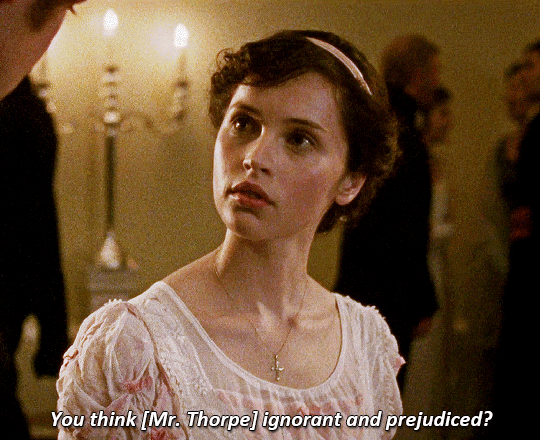


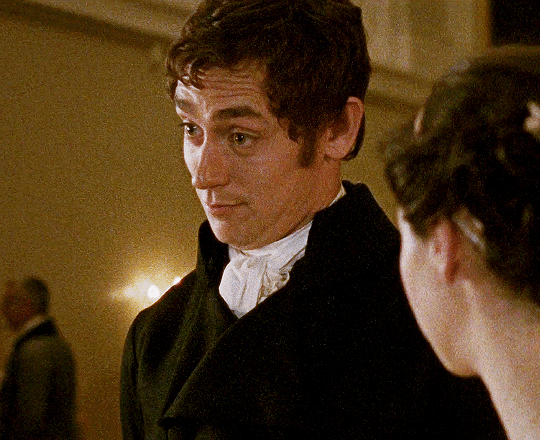
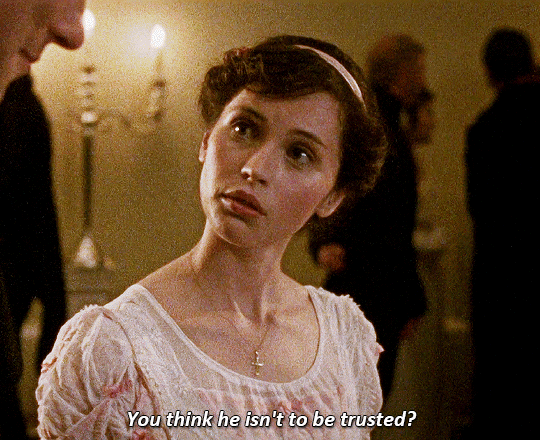


NORTHANGER ABBEY (2007) dir. Jon Jones
1K notes
·
View notes
Text
Northanger Abbey Readthrough, Ch 4
Catherine is fully prepared to meet Mr. Tilney again but he is nowhere to be found! Disaster!
However, good is on the horizon, Mrs. Allen finally finds a friend, Mrs. Thorpe, an old schoolfellow. Austen throws in a great joke:
Their joy on this meeting was very great, as well it might, since they had been contented to know nothing of each other for the last fifteen years.
Austen brings up this again in Mansfield Park, where for all her sisterly love, Mrs. Norris will not put herself in any expense to see her sister:
It had, in fact, occurred to her, that though taken to Portsmouth for nothing, it would be hardly possible for her to avoid paying her own expenses back again. So her poor dear sister Price was left to all the disappointment of her missing such an opportunity, and another twenty years’ absence, perhaps, begun. (Ch 37)
It is such a true thing, a sad thing, that we claim to love people and yet are content to never see them... (Or even write) This is clearly performative friendship, but it happens with real ones too.
I love the "friendship" between Mrs. Allen and Mrs. Thorpe because it is so true to life, they both talk about themselves and really don't listen to the other:
they proceeded to make inquiries and give intelligence as to their families, sisters, and cousins, talking both together, far more ready to give than to receive information, and each hearing very little of what the other said.
Also, Mrs. Allen unable to brag about children contents herself by knowing she has more handsome lace!
So I have heard theories that this whole meeting was planned by the Thorpes, but honestly, the Thorpes are not that good at planning. Also, the childhood acquaintance is real. It seems likely to me that the Thorpes were already going to Bath to husband hunt and John Thorpe planned to bring James, but everything else was a "happy" coincidence.
We meet the three Thorpe sisters:
Her eldest daughter had great personal beauty, and the younger ones, by pretending to be as handsome as their sister, imitating her air, and dressing in the same style, did very well.
This comes much later, but the younger Thorpe sisters are basically clones of Isabella. We hear them talk and it's identical to Isabella. I cannot imagine spending time with this family! I would explode.
Miss Thorpe, however, being four years older than Miss Morland, and at least four years better informed, had a very decided advantage in discussing such points; she could compare the balls of Bath with those of Tunbridge, its fashions with the fashions of London; could rectify the opinions of her new friend in many articles of tasteful attire; could discover a flirtation between any gentleman and lady who only smiled on each other; and point out a quiz through the thickness of a crowd.
Quiz does not mean "a short test" until the 1850s. The word quiz is used a lot in Northanger Abbey and it's current meaning is, "odd person, person or thing deemed ridiculous".
This passage reminds me a lot of a section from Austen's Love and Freindship:
Isabel had seen the World. She had passed 2 Years at one of the first Boarding-schools in London; had spent a fortnight in Bath and had supped one night in Southampton. “Beware my Laura (she would often say) Beware of the insipid Vanities and idle Dissipations of the Metropolis of England; Beware of the unmeaning Luxuries of Bath and of the stinking fish of Southampton.”
In both passages, I believe we are meant to understand that the informant is not actually that informed, they just look worldly to our poor naive heroine.
This passage is a jab at the novel style of the era:
This brief account of the family is intended to supersede the necessity of a long and minute detail from Mrs. Thorpe herself, of her past adventures and sufferings, which might otherwise be expected to occupy the three or four following chapters; in which the worthlessness of lords and attorneys might be set forth, and conversations, which had passed twenty years before, be minutely repeated.
I didn't really understand the reference until I read Belinda by Maria Edgeworth, wherein a character gave a 36 PAGE history of herself. It was very strange to read and not very natural. So good on Austen for realizing that style was terrible.
Also, this much loved quote is so sarcastic:
Catherine was delighted with this extension of her Bath acquaintance, and almost forgot Mr. Tilney while she talked to Miss Thorpe. Friendship is certainly the finest balm for the pangs of disappointed love.
Ah yes, her disappointed love of not seeing the guy she danced with for one evening! And her friendship of about 10 minutes.
#northanger abbey readthrough#ch 4#northanger abbey#catherine morland#mrs. thorpe#mrs. allen#isabella thorpe
46 notes
·
View notes
Photo
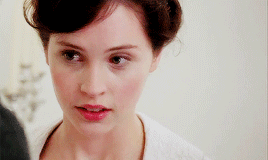
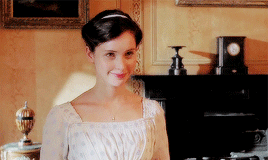




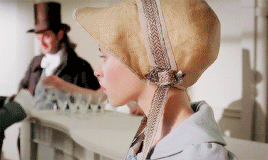
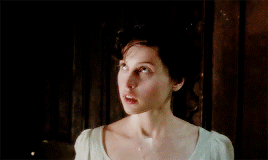
No one who had ever seen Catherine Morland in her infancy would have supposed her born to be an heroine.
Felicity Jones as Catherine Morland in Northanger Abbey (requested by anonymous)
#perioddramaedit#austenedit#northanger abbey#tv: northanger abbey#author: jane austen#ch: catherine morland#19th century#late modern#regency era#shows#gifs#request#maria
1K notes
·
View notes
Photo

I found this meme template on Memedroid and took it to myself to write “Fanny when she is faced with the tiniest bit of confrontation:”. Every time I read this book I just cannot fathom Fanny– does she have a spine? Or thoughts? Or words? Or intelligence? I do not know, but it honestly seems like the answer is “none of the above.”
Fanny is unlike any other Jane Austen “heroines” I have witnessed. She is similar to that of Catherine Morland, who Jane Austen’s descriptions of sometimes parallel that of fanny Price. Jane describes Fanny as having “no glow of complexion, nor any other striking beauty; exceedingly timid and shy, and shrinking from notice” (Mansfield Park, Ch. II). This is similar to that of Catherine who is describes by Jane to be “almost pretty”. However, Catherine is seen as a relatable heroine who I, like many readers, actually root for. So, why is it that two young and seemingly similar heroines can provoke such different responses from the readers? I think it boils down to this meme. Fanny has no agency.
Northanger Abbey is a bildungsroman of the progression of Catherine Morland, an average girl who learns how to grow up. From the first line of the novel, she is set apart to make something great out of herself in becoming a heroine. The descriptions of the early stages of her life paint her as a girl with a mind of her own. She plays sports with the boys and follows her own arrow, even quitting the instrument that her mother so wished for her to play. Northanger Abbey follows Catherine’s development into the adult world, as traveling to Bath completely changes her life and thrusts her into the world of romance and deceit. It is throughout this trip to Bath that Catherine is able to mature. The defining moment of her maturity is when she reads the letter her supposed best friend Isabelle sends her. In this moment, Catherine begins to see through other peoples’ ulterior motives, and she begins to act for herself. This is not what I see from Mansfield Park, as, although it follows Fanny’s life from 10 to 18 years of age, she does not actually progress. Fanny does not even act, let alone act for herself like Catherine. She is simply annoying.
This meme template instantly reminded me of most of Fanny’s inactions, especially throughout Volume III. Henry describes her, on page 203, saying: “’Now she is dependent, helpless, friendless, neglected, forgotten.’” (Mansfield Park, Ch. XII) I think the word “now” is really powerful in this sentence, as she has grown. She is no longer a little helpless girl, but a big helpless person. This description is proven correct, as after being spoken to by Henry, “Fanny could not speak” (203). She “feel[s], think[s], tremble[s] about everything” (206), but will not actually do anything. That’s why she is dislikable and that is why this meme is the embodiment of Fanny. The feelings and thoughts are there but the ability to act upon this never surfaces. She is not able to follow the same progression as other heroines and serves as an inconvenience throughout this entire novel. She constantly constrains herself as the throat in this meme is constrained, and must constantly feel as though her throat is on fire because she never lets her thoughts and feelings out.
Most people like characters for the tangible progression and change they make throughout their timeline. Fanny is not likable because she remains flat throughout the novel. While it is important to note that she is severely mistreated by those around her, it is frustrating as a reader to see a supposed heroine have absolutely no agency.
1 note
·
View note
Text
Ch 14:
“Not very good, I am afraid. But now really, do not you think Udolpho the nicest book in the world?” “The nicest—by which I suppose you mean the neatest. That must depend upon the binding.” “Henry,” said Miss Tilney, “you are very impertinent. Miss Morland, he is treating you exactly as he does his sister. He is forever finding fault with me, for some incorrectness of language, and now he is taking the same liberty with you. The word ‘nicest,’ as you used it, did not suit him; and you had better change it as soon as you can, or we shall be overpowered with Johnson and Blair all the rest of the way.” “I am sure,” cried Catherine, “I did not mean to say anything wrong; but it is a nice book, and why should not I call it so?” “Very true,” said Henry, “and this is a very nice day, and we are taking a very nice walk, and you are two very nice young ladies. Oh! It is a very nice word indeed! It does for everything. Originally perhaps it was applied only to express neatness, propriety, delicacy, or refinement—people were nice in their dress, in their sentiments, or their choice. But now every commendation on every subject is comprised in that one word.”
Link to full text for more
maybe I'm hallucinating this or I read the passage too quickly, but one of my favorite Jane Austen passages of all time is in Northanger Abbey, where Eleanor Tilney, Henry Tilney, and Catherine Morland are having a nice walk. At some point, spurred on by Catherine calling something "nice" or "fine" or "neat" (not sure which,) Henry then goes on this rant grousing about Kids These Days Ruining the English Language, Especially Young Women, and when he's finished his rant, very proud of himself, both Eleanor and Catherine don't say anything and shoot him an absolutely incredulous look. Henry never brings the topic up again.
I love it, tell us how you *really* feel about dudes who mansplain language, Miss Austen, do go off.
...BRB gonna go digging into Northanger Abbey to make sure I'm not hallucinating this
106 notes
·
View notes
Text
Northanger Abbey Readthrough Ch 18
Catherine learns that not only does John Thorpe think he proposed, he also seems to think that Catherine accepted! (or at least received his hints favourably) "He says so in this letter, says that he as good as made you an offer, and that you received his advances in the kindest way; and now he wants me to urge his suit, and say all manner of pretty things to you."
This reminds me of Mansfield Park, which contains a ton of flirting (or attempted flirting) by proxy. Mary Crawford is very happy to have Henry send messages to Fanny Price via herself, creating a loophole in the rule that men cannot write to single women. She also attempts to have Edmund write a message to Tom Bertram, way back at the beginning when she is angling for the heir. It makes me think that this might have been a common practice.
Isabella's one track mind is very set on a single track. Gone are mentions of clergymen and James, he's been replaced:
Tilney says it is always the case with minds of a certain stamp.... Tilney says there is nothing people are so often deceived in as the state of their own affections, and I believe he is very right.
This Tilney is none other than the charming Captain Tilney and he has certainly turned Isabella's head! Isabella attempts to soften the oncoming blow to Catherine by comparing her situation to Catherine's:
“A little harmless flirtation or so will occur, and one is often drawn on to give more encouragement than one wishes to stand by. But you may be assured that I am the last person in the world to judge you severely. All those things should be allowed for in youth and high spirits. What one means one day, you know, one may not mean the next. Circumstances change, opinions alter... I would not for all the world be the means of hurrying you into an engagement before you knew what you were about. I do not think anything would justify me in wishing you to sacrifice all your happiness merely to oblige my brother, because he is my brother, and who perhaps after all, you know, might be just as happy without you, for people seldom know what they would be at, young men especially, they are so amazingly changeable and inconstant. What I say is, why should a brother’s happiness be dearer to me than a friend’s?"
She is laying the groundwork to jilt James, which is just gross. Catherine has done nothing like Isabella is planning to do! And this line, "there are more ways than one of our being sisters." Catherine does not catch the meaning, but Isabella must mean that they would be sisters if Catherine married Henry and she married Frederick.
Isabella is also suddenly focused on wealth, which distresses her dearest friend.
Catherine overhears Isabella flirting with Captain Tilney and leaves in disgust. She has had another bad day, The compliment of John Thorpe’s affection did not make amends for this thoughtlessness in his sister. She was almost as far from believing as from wishing it to be sincere. And she's convinced that Isabella is engaging in the flirtation unconsciously.
Oh sweet summer child...
Persuasion comparison again! Anne is convinced that Wentworth is flirting with multiple girls unconsciously too and I... mostly agree... (I think there was a hint of spite too)
Other opportunities of making her observations could not fail to occur. Anne had soon been in company with all the four together often enough to have an opinion, though too wise to acknowledge as much at home, where she knew it would have satisfied neither husband nor wife; for while she considered Louisa to be rather the favourite, she could not but think, as far as she might dare to judge from memory and experience, that Captain Wentworth was not in love with either. They were more in love with him; yet there it was not love. It was a little fever of admiration; but it might, probably must, end in love with some. Charles Hayter seemed aware of being slighted, and yet Henrietta had sometimes the air of being divided between them. Anne longed for the power of representing to them all what they were about, and of pointing out some of the evils they were exposing themselves to. She did not attribute guile to any. It was the highest satisfaction to her to believe Captain Wentworth not in the least aware of the pain he was occasioning. There was no triumph, no pitiful triumph in his manner. He had, probably, never heard, and never thought of any claims of Charles Hayter. He was only wrong in accepting the attentions (for accepting must be the word) of two young women at once.
But we all know Wentworth is no Isabella, he isn't going for wealth, I will grant him that.
#northanger abbey#northanger abbey readthrough#ch 18#isabella thorpe#john thorpe#catherine morland#captain tilney#flirting by proxy
26 notes
·
View notes
Photo










#nothanger abbey#JAFF#catherine morland#eleanor tilney#henry tilney#isabella thorpe#susan morland#jane austen#jane austen with cell phones#I want to do one of these for Emma#But oh the time#ch 11 is when John lies to make Catherine go on a ride with them#I always want to save her from that day#even though it doesn't matter in the end#the only technology they have is cell phones#nothing else
25 notes
·
View notes
Note
Sorry but catherine has not seen a tomboy in her life 😭
Ummmm..... not sure what you mean here anon, but Catherine Morland certainly started out as a tomboy:
She was fond of all boys’ plays, and greatly preferred cricket not merely to dolls...
-Northanger Abbey, Ch 1, Jane Austen
34 notes
·
View notes
Text
Northanger Abbey Readthrough, Ch 3
❤️❤️HENRY TILNEY HAS ARRIVED!❤️❤️
The master of the ceremonies, Mr. King, who introduces Henry Tilney and Catherine Morland is one of the two real people mentioned as characters in Austen's novels (the other being Humphrey Repton in Mansfield Park, a real famous landscaper). Mr. King was retired by the time of publication.
I love Henry's description:
He seemed to be about four or five and twenty, was rather tall, had a pleasing countenance, a very intelligent and lively eye, and, if not quite handsome, was very near it. His address was good, and Catherine felt herself in high luck.
Ah, he is well matched with "almost pretty" Catherine Morland.
Henry Tilney is a lot like a male Elizabeth Bennet, "there was an archness and pleasantry in his manner" and "there was a mixture of sweetness and archness in her manner" (Pride & Prejudice, Ch 10) sound very similar. We also have the descriptions of their eyes being intelligent.
Now because I believe in Henry Tilney Supremacy, let me point out that Henry went to a ball where he didn't know anyone and instead of making everyone else uncomfortable (DARCY!) or just not going and doing his business (Knightley), he uses of the Master of Ceremonies to get a partner and then is just delightful. Darcy begins with insulting Elizabeth and Henry begins by being utterly charming. Just the best guy.
He starts with a hilarious bit, and while Catherine isn't sure if she's allowed to laugh, she's clearly enjoying herself. Then Tilney offers two opposing things for her to write in her journal:
Friday, went to the Lower Rooms; wore my sprigged muslin robe with blue trimmings—plain black shoes—appeared to much advantage; but was strangely harassed by a queer, half-witted man, who would make me dance with him, and distressed me by his nonsense.
or
I danced with a very agreeable young man, introduced by Mr. King; had a great deal of conversation with him—seems a most extraordinary genius—hope I may know more of him. That, madam, is what I wish you to say.
Clearly the second passage is what Catherine would actually write, though maybe not that Tilney was an extraordinary genius. She is having a very good time.
Then they discuss if women or men write better letters. Catherine is unsure that women are superior, and after some gentle teasing Henry basically agrees and says this lovely progressive opinion:
"I should no more lay it down as a general rule that women write better letters than men, than that they sing better duets, or draw better landscapes. In every power, of which taste is the foundation, excellence is pretty fairly divided between the sexes."
And then we get to Henry's most famous attribute, he understands muslins!
Catherine is a bit confused by Henry's behaviour, but she does like it (and him). However, we again have some Elizabeth Bennet vibes with this observation, "Mr. Tilney was polite enough to seem interested in what she said; and she kept him on the subject of muslins till the dancing recommenced. Catherine feared, as she listened to their discourse, that he indulged himself a little too much with the foibles of others"
There are many who think Catherine is too unintelligent to be paired with Henry Tilney, but he clearly has more respect for her than Mrs. Allen, who we are told has, "a trifling turn of mind". She is catching more of his jokes than her chaperone.
She has detected a flaw in Mr. Tilney! (This will apparently be very much forgotten later). Catherine also tells something of a lie, but then is immediately honest about it:
Catherine coloured, and said, “I was not thinking of anything.” “That is artful and deep, to be sure; but I had rather be told at once that you will not tell me.” “Well then, I will not.”
The narrator then points out that it is very bad for a heroine to think fondly of a man before he is known to love her. This is a reference to a ridiculous letter in The Rambler, where it is written: That a young lady should be in love, and the love of the young gentleman undeclared, is an heterodoxy which prudence, and even policy, must not allow. It's pretty nuts, read the whole thing if you are curious.
And we see proof of Mr. Allen's sensibleness, he quickly inquire into Mr. Tilney and finds him to be from a good family and a clergyman. Catherine is being well cared for!
74 notes
·
View notes
Text
Northanger Abbey Readthrough Ch 25
Catherine might have missed like 99% of Henry Tilney's flirting, but she has an inkling it has happened, maybe, "He had—she thought he had, once or twice before this fatal morning, shown something like affection for her."
Which is why I love this meme so much:
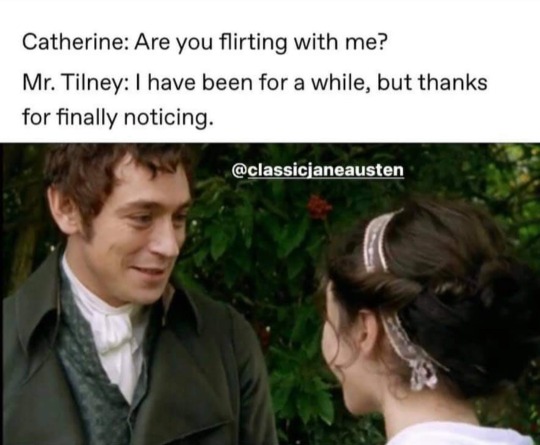
Again, Catherine touches upon Marianne Dashwood behaviour but she just can't really commit, "But now—in short, she made herself as miserable as possible for about half an hour, went down when the clock struck five, with a broken heart, and could scarcely give an intelligible answer to Eleanor’s inquiry if she was well." However, by the end of the evening and with Henry being kinder than ever, she has recovered. she had nothing to do but to forgive herself and be happier than ever; and the lenient hand of time did much for her by insensible gradations in the course of another day. She does indeed bounce back quickly!
Catherine reflects that in England at least, the type of villains described by Mrs. Radcliff must not exist. She doesn't go so far as to pardon France and Switzerland from containing such evil, but she's pretty sure about her own country. She also believes that while Henry and Eleanor may not be perfect (never!), she's certain that General Tilney has some "specks" in his character. Well you've come a long way girl, we won't ask for more just yet.
Murder was not tolerated, servants were not slaves, and neither poison nor sleeping potions to be procured, like rhubarb, from every druggist.
Quick, someone tell Shakespeare!
Now Catherine's thoughts return to Bath, but she has no news. Her faithful friend has proved unfaithful again: But Isabella had promised and promised again; and when she promised a thing, she was so scrupulous in performing it! Oh Catherine...
Not as bad as her brother though! Poor Thorpe is in town: I dread the sight of him; his honest heart would feel so much. Honest heart! That man doesn't have an honest cell in his entire body! I would have more hope for James if we knew he finally figured out John, but the only hint we have is this: the failure of a very recent endeavour to accomplish a reconciliation between Morland and Isabella. So James and John met again and John tried to get them back together, but whether James rejected both siblings or just one is unknown.
I really feel for Catherine here, she has to sit through breakfast trying not to cry, then cannot return to her room because it is being cleaned (bedrooms in this era were mostly for dressing and sleeping, so she wouldn't be expected to use her room again until 4pm*), tries the drawing room only to discover the Tilney siblings, but then they kindly leave her to herself. Catherine needs another half hour (her magical sad-feeling time) before she can face them.
This line from Catherine is so very Jane Bennet:
"Could you have believed there had been such inconstancy and fickleness, and everything that is bad in the world?”
What a stroke was this for poor Jane, who would willingly have gone through the world without believing that so much wickedness existed in the whole race of mankind as was here collected in one individual! -Pride & Prejudice, of Wickham
The poor girls, having their eyes opened to the wickedness of the world.
Then this part:
This post by Fira Wren playing in my head. His kids know the General is full of it. Eleanor is surprised her older brother has fallen in love, since it seems he never has been before, which again has Henry Crawford vibes.
No, not very. I do not believe Isabella has any fortune at all: but that will not signify in your family. Your father is so very liberal! He told me the other day that he only valued money as it allowed him to promote the happiness of his children.” The brother and sister looked at each other.
Now the reason that Isabella Thorpe would lose in a battle to the death against Lucy Steele and Lady Susan is that she didn't keep her first man secure until she had the next engagement entirely locked down. Rookie movie Izzy! I have too good an opinion of Miss Thorpe’s prudence to suppose that she would part with one gentleman before the other was secured. Isabella just could not manage two men at once.
I love this interaction:
This line from Catherine too, "I never was so deceived in anyone’s character in my life before.” and Henry's response: “Among all the great variety that you have known and studied.” has so much in common with this interaction in Pride & Prejudice:
“But perhaps,” observed Catherine, “though she has behaved so ill by our family, she may behave better by yours. Now she has really got the man she likes, she may be constant.” “Indeed I am afraid she will,” replied Henry; “I am afraid she will be very constant, unless a baronet should come in her way; that is Frederick’s only chance. I will get the Bath paper, and look over the arrivals.”
“I did not know before,” continued Bingley, immediately, “that you were a studier of character. It must be an amusing study.” “Yes; but intricate characters are the most amusing. They have at least that advantage.” “The country,” said Darcy, “can in general supply but few subjects for such a study. In a country neighbourhood you move in a very confined and unvarying society.” “But people themselves alter so much, that there is something new to be observed in them for ever.”
Henry also manages to tip us off about his intentions to marry Catherine right under Catherine's oblivious nose!
"Prepare for your sister-in-law, Eleanor, and such a sister-in-law as you must delight in! Open, candid, artless, guileless, with affections strong but simple, forming no pretensions, and knowing no disguise.”
“Such a sister-in-law, Henry, I should delight in,” said Eleanor with a smile.
Catherine also realizes that she feels much less sad about losing Isabella than she thought she would, which Henry tells her to think about. The falseness of Isabella's friendship is dawning on Catherine, perhaps now just unconsciously.
*Quote illuminating this point from Wives & Daughters by Elizabeth Gaskell, spoke by a character who would have been young during the Regency era: 'No, no, Cromer: bedrooms are for sleeping in, and sitting-rooms are for sitting in. Keep everything to its right purpose, and don't try and delude me into nonsense.' Why, my mother would have given us a fine scolding if she had ever caught us in our bedrooms in the daytime. We kept our out-door things in a closet downstairs; and there was a very tidy place for washing our hands, which is as much as one wants in the daytime.
54 notes
·
View notes
Text
Northanger Abbey Readthrough Ch 14
PEOPLE THIS IS THE BEST CHAPTER EVER!!!! We have reached the pinnacle of Tilney awesomeness...
my heroine was most unnaturally able to fulfil her engagement, though it was made with the hero himself. This always makes me think of Evelina by Fanny Burney, where the poor heroine always is taken places she doesn't want to go. Luckily for us, the country walk is actually happening! No Thorpes! No rain! Just charming Tilneys.
One of the best earnest quotes in Austen has happened!:
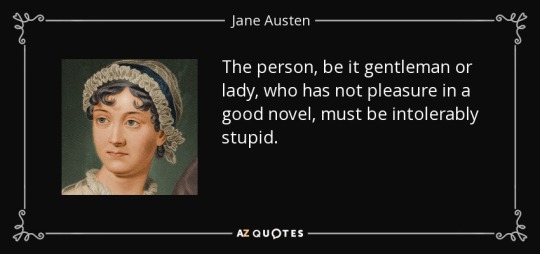
The narrator has taken more of a back seat at this point, but here we have the hero of the novel, openly admitting that not only does he read novels, but he loves them. Henry also seems to understand that Catherine has been mocked about this before, he's very overt in his appreciation of novels. And he calls on her to be proud of him for stealing a novel from his sister, which is just... 🥰🥰🥰 "I am proud when I reflect on it, and I think it must establish me in your good opinion.”
Now is Tilney a little pedantic? Yes. But I find it cute. Sue me.
"...But I really thought before, young men despised novels amazingly.” “It is amazingly; it may well suggest amazement if they do—for they read nearly as many as women.
Catherine has picked up a lot of language from Isabella and Mr. Tilney is subtlety (and not so subtlety) correcting it.
“Henry,” said Miss Tilney, “you are very impertinent. Miss Morland, he is treating you exactly as he does his sister. He is forever finding fault with me, for some incorrectness of language, and now he is taking the same liberty with you. The word ‘nicest,’ as you used it, did not suit him; and you had better change it as soon as you can, or we shall be overpowered with Johnson and Blair all the rest of the way.”...
“Very true,” said Henry, “and this is a very nice day, and we are taking a very nice walk, and you are two very nice young ladies. Oh! It is a very nice word indeed! It does for everything. Originally perhaps it was applied only to express neatness, propriety, delicacy, or refinement—people were nice in their dress, in their sentiments, or their choice. But now every commendation on every subject is comprised in that one word.”
Henry is pointing out both overuse of the word nice and meaning drift. You see a lot of meaning drift comparing Austen's language to ours, words like wonderful, awful, interest, etc. Nice apparently used to mean something close to "neat" and now it means "pleasant" and Henry Tilney is in a battle to preserve it. Well sorry, Mr. Tilney, but you lost. He has a point though, the overuse of a word entirely dilutes it's meaning and can make it basically mean nothing at all.
I love Catherine's speech about history:
The quarrels of popes and kings, with wars or pestilences, in every page; the men all so good for nothing, and hardly any women at all—it is very tiresome: and yet I often think it odd that it should be so dull, for a great deal of it must be invention. The speeches that are put into the heroes’ mouths, their thoughts and designs—the chief of all this must be invention, and invention is what delights me in other books.
She's so right here!
Now while Catherine does spend a lot of time in awe of Henry Tilney and his wit, she does stand on her own opinions. She asserts that "torment" and "instruct" are synonymous and to borrow the phrase of another Austen woman, she will not be laughed out of her opinion! (Jane Bennet, P&P)
Eleanor and Henry soon begin to talk about the picturesque, and from the clues it seems they have opinions similar to Marianne Dashwood and her love of dead leaves. This section is the one I see most quoted by those who think Catherine is too stupid for Henry Tilney or that he is distasteful for wanting to marry an ignorant girl.
I will first point out that ignorance is not equal to stupidity, Catherine is eager to learn. Also, I doubt Henry would have anything to do with the vapid Isabella Thorpe. Catherine may be ignorant about drawing and have trouble with discerning motives, but she is in no way an idiot. If anything, Austen is mocking this sentiment:
Where people wish to attach, they should always be ignorant. To come with a well-informed mind is to come with an inability of administering to the vanity of others, which a sensible person would always wish to avoid. A woman especially, if she have the misfortune of knowing anything, should conceal it as well as she can.
But Catherine did not know her own advantages—did not know that a good-looking girl, with an affectionate heart and a very ignorant mind, cannot fail of attracting a clever young man, unless circumstances are particularly untoward.
Does Henry enjoy being admired by Catherine in all his wit and knowledge? Undoubtedly, yes. But he also loves hanging around Eleanor who is just as intelligent as him (riot fears aside). The chief attraction here is not the ignorance. It's primarily the honesty. Here again we have Catherine fully prepared to admit that she doesn't like reading history and that she knows nothing of drawing. She doesn't pretend, she is a creature of no disguise.
Now we get to see Henry making very suggestive statements that go right over Catherine's poor head:
"...Miss Morland is not used to your odd ways.” “I shall be most happy to make her better acquainted with them.” “No doubt; but that is no explanation of the present.”
No doubt! Eleanor is shipping this couple hard. Good for her.
It was no effort to Catherine to believe that Henry Tilney could never be wrong.
Oh Catherine, you've got it bad.
We hear from an Isabella clone (her younger sister), who was left behind from the Clifton Scheme, she is with two of the sweetest girls in the world, who had been her dear friends all the morning and says:
“They set off at eight this morning,” said Miss Anne, “and I am sure I do not envy them their drive. I think you and I are very well off to be out of the scrape. It must be the dullest thing in the world, for there is not a soul at Clifton at this time of year. Belle went with your brother, and John drove Maria.”
Girl, your speech is dripping with envy so much that even Catherine Morland, our intrepid heroine, realizes that you spouting bullshit.
I will give like, 1 half point to Thorpe for actually helping Isabella out and driving his sister to Clifton. But I award it very begrudgingly.
#northanger abbey#northanger abbey readthrough#catherine morland#henry tilney#the best chapter ever#I wait until I reach it#It is wonderful
64 notes
·
View notes
Text
Northanger Abbey Readthrough Ch 11
Important context for this chapter! Blaize Castle is a FAKE CASTLE:

known as a "folly". It's basically a very large lawn ornament. It was built in 1766, so John Thorpe is lying through his teeth when he says it's the oldest in the kingdom, it's only about 40 years old by Catherine's time.
I love that Mr. Allen refuses to predict the weather when he's not at home. I love Mrs. Allen's little dig about Catherine not minding dirt (makes me wonder if Catherine has ruined a few cushions in her day). I love poor Catherine sitting at the window counting umbrellas and hoping her walk will happen!
Now, I do wonder that the Tilneys didn't send Catherine a note. It was at least 12:40 when the Thorpes showed up, then they talked, and Catherine sees the Tilneys walking towards her lodgings. It must be 1:00 p.m. by then. These Tilneys are rich, can't they send a servant to say they're coming? Did they really expect Catherine to just wait all day?
Great quote:
she meditated, by turns, on broken promises and broken arches, phaetons and false hangings, Tilneys and trap-doors.
Catherine finally has had enough of Mr. Thorpe:
“If your brother had not got such a d—— beast to drive,” said he soon afterwards, “we might have done it very well. My horse would have trotted to Clifton within the hour, if left to himself, and I have almost broke my arm with pulling him in to that cursed broken-winded jade’s pace. Morland is a fool for not keeping a horse and gig of his own.” “No, he is not,” said Catherine warmly, “for I am sure he could not afford it.” “And why cannot he afford it?” “Because he has not money enough.” “And whose fault is that?” “Nobody’s, that I know of.” Thorpe then said something in the loud, incoherent way to which he had often recourse, about its being a d—— thing to be miserly; and that if people who rolled in money could not afford things, he did not know who could, which Catherine did not even endeavour to understand. Disappointed of what was to have been the consolation for her first disappointment, she was less and less disposed either to be agreeable herself or to find her companion so; and they returned to Pulteney Street without her speaking twenty words.
Now of course, we know with hindsight that John has decided (for some reason) that James is very rich, so he doesn't understand why James doesn't keep a carriage. Now Catherine knows that her family isn't super wealthy, so I'm sure all of this talk is just incomprehensible to her. But who in their right mind could understand John Thorpe...
Poor Catherine gets no country walk, no Blaize Castle, and no Tilneys. Her day is ruined and she is consighed to cry forever on a pillow strewn with thorns... (maybe Marianne would, but not our girl Catherine)
It also seems that Catherine is beginning to notice that Isabella Thorpe isn't exactly the great friend she appeared to be at first:
Catherine could almost have accused Isabella of being wanting in tenderness towards herself and her sorrows, so very little did they appear to dwell on her mind, and so very inadequate was the comfort she offered.
I just find this whole chapter so painful, it is the epitome of FOMO, instead of hiking with her crush and his sister, she is forced to endure John Freaking Thorpe and not even have the added bonus of a castle!
The relationship of Catherine and the Tilneys is also full of these small misunderstandings and interpretations of propriety (we will see more next chapter). Miss Tilney feeling for a card and not leaving one can be seen as an indication that she wants to break off the acquaintance, or she may just have had no card. Now since she was planning on a country walk, no card is plausible, but poor Catherine is very worried that the Tilneys were insulted by her behaviour.
As a last note, this man is the worst:
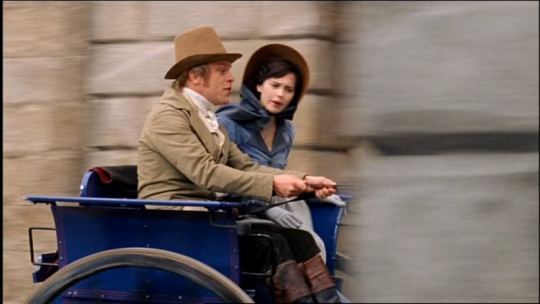
(and so well cast in 2007!)
#northanger abbey readthrough#northanger abbey#john thorpe#the worst day#isabella thorpe#james morland#catherine morland
61 notes
·
View notes
Text
Northanger Abbey Readthrough Ch 31
Whew, I have reached the end. That was a lot of work. We'll see if I do another one of these...
but as nothing, after all, could be more natural than Catherine’s being beloved
Awwwww...
Also, the Morlands 🤝Jane Bennet, believing that their beloved person will obviously be beloved by others:
Miss Bennet’s astonishment was soon lessened by the strong sisterly partiality which made any admiration of Elizabeth appear perfectly natural -Pride & Prejudice, Ch 40 (This is when Elizabeth tells Jane about Darcy's first proposal)
having never heard evil of him, it was not their way to suppose any evil could be told.
This becomes a really big deal in Sense & Sensibility, Pride & Prejudice, and Persuasion, Elinor is constantly asking for more information about Willoughby, Meryton's not knowing about Wickham's character causes havoc, and Mr. Elliot is another case of hidden information revealing his character. Fortunately for Catherine, Henry is perfect.
Now, Henry may have been cut off from his father, but he's by no means poor, Of a very considerable fortune, his son was, by marriage settlements, eventually secure; his present income was an income of independence and comfort, and under every pecuniary view, it was a match beyond the claims of their daughter. It sounds like Woodston is a very good living, probably similar to Edmund's £800/year, so Henry is fully independent without any help from his father. It sounds like he will also inherit a portion of his mother's dowry when his father dies. Catherine bagged a catch! (without knowing it)
Henry returned to what was now his only home, to watch over his young plantations, and extend his improvements for her sake, to whose share in them he looked anxiously forward; and Catherine remained at Fullerton to cry. Whether the torments of absence were softened by a clandestine correspondence, let us not inquire. Mr. and Mrs. Morland never did—they had been too kind to exact any promise; and whenever Catherine received a letter, as, at that time, happened pretty often, they always looked another way.
Oh it's so cute. I can't even. But also, I WANT TO READ THOSE LETTERS!!!! Cruel Authoress, Jane Austen, giving me that tease. I want to read Henry Tilney sending little Gothic stories to Catherine with subtle sexual undertones...
Anyway
Then the narrator is like, "It's obviously the end of the novel, so you know this will resolve soon." Ah yes, so we do. Excellent observation.
Eleanor marries Lord Laundry List and paves the way for Catherine to get her man. This explanation of it is just so good:
I have only to add—aware that the rules of composition forbid the introduction of a character not connected with my fable—that this was the very gentleman whose negligent servant left behind him that collection of washing-bills, resulting from a long visit at Northanger, by which my heroine was involved in one of her most alarming adventures.
To begin perfect happiness at the respective ages of twenty-six and eighteen is to do pretty well
The narrator really comes back in this last chapter and teases us with this immoral "moral" message:
and professing myself moreover convinced that the General’s unjust interference, so far from being really injurious to their felicity, was perhaps rather conducive to it, by improving their knowledge of each other, and adding strength to their attachment, I leave it to be settled, by whomsoever it may concern, whether the tendency of this work be altogether to recommend parental tyranny, or reward filial disobedience.
Lady Catherine plays this same role in Pride & Prejudice, as an aside. But yes, is the moral of this story that parental tyrants are good for love, or that being a rebellious son is rewarded? Either way, not the sort of moral a good, upstanding citizen should want.
What more can I say? I love this novel. It's so relatable, it's so human, the characters are so well drawn even though they are parodies! I want to be Catherine's best friend but I also want to steal her husband. General Tilney needs to fall down a staircase (a recently renovated one).
52 notes
·
View notes
Text
Northanger Abbey Readthrough, Ch 1
Welcome to the Northanger Abbey Readthrough, October 2023! I will be posting one chapter per day, which will take us right to Halloween. This readthrough does contain spoilers, because I can't help myself.
We begin with the advertisement from the author, who is clearly annoyed that her first novel was purchased and then not published.
That any bookseller should think it worth-while to purchase what he did not think it worth-while to publish seems extraordinary.
While Jane Austen notes that books have changed, by which I assume she means the popularity of some of the novels referenced, I am pleased to inform you that Anthony Trollope mentioned Mrs. Radcliff and The Mysteries of Udolpho in his 1987 novel, Barchester Towers! Even the veil! So clearly the novels she was satirizing had not yet gone out of style.
On to the story! Catherine Morland is so very normal. The most normal girl ever. She also isn't an orphan, both her parents are living which the narrator points out is very hard for a heroine (lol). She doesn't really like lessons and she likes running around and rolling down hills.
She never could learn or understand anything before she was taught; and sometimes not even then, for she was often inattentive, and occasionally stupid.
Catherine's indifference to flowers will come up later, but this line is also funny in a forbidden fruit way:
Indeed she had no taste for a garden; and if she gathered flowers at all, it was chiefly for the pleasure of mischief—at least so it was conjectured from her always preferring those which she was forbidden to take.
This is a great description of an older sibling (I like to think this describes me as an older sister):
very kind to the little ones, with few interruptions of tyranny
And her family is so good and normal too! Her mom seems to have some good parenting practices:
She learnt a year, and could not bear it; and Mrs. Morland, who did not insist on her daughters being accomplished in spite of incapacity or distaste, allowed her to leave off.
The Morland family seems like a strong contrast to the Bennets, both of them employing no governess. We learn that the Morlands are actively invested in their children's education (unlike the Bennets):
Writing and accounts she was taught by her father; French by her mother: her proficiency in either was not remarkable, and she shirked her lessons in both whenever she could.
And even though the older girls are left to "shift for themselves", Mrs. Morland, who is both poorer and has double the children, can be more easily excused for some neglect. She sounds like a slave to the children's education, unlike Mrs. Bennet!
Catherine, a tomboy, begins to become interested in more feminine pursuits, but she does not transform into a great beauty or an accomplished young lady. Her achievements are similar to those of the ordinary person:
So far her improvement was sufficient—and in many other points she came on exceedingly well; for though she could not write sonnets, she brought herself to read them; and though there seemed no chance of her throwing a whole party into raptures by a prelude on the pianoforte, of her own composition, she could listen to other people’s performance with very little fatigue.
Catherine is just the most relatable heroine ever! She's adequate. She's reasonably intelligent, passingly pretty, a true Every Woman. And really, the whole novel is full of so many small human moments that hit just as hard as the more dramatic ones from other novels (Lucy telling Elinor Edward is engaged to her, Louisa falling from the Cobb, Lydia's elopement) because they are things that might happen to anyone. Really wanting to see your crush and instead having to hang out with someone you dislike; not knowing if someone is angry at you or not; and finding out your friend isn't a real friend... Northanger Abbey somehow explores the most ordinary things without making them boring.
Also, while Catherine may seem unintelligent, the girl must have read a lot of Shakespeare, the quotes in this chapter come from Twelfth Night, Measure for Measure, and Othello. I reluctantly read 5 Shakespearean plays in high school, so Catherine is at about par with my education (I like Shakespeare now! I learned to appreciate him in university when I saw a few of the plays in person).
Catherine is also such a happy, bubbly, character. I can really imagine her being "all happiness" when her parents consent to her trip to Bath. We are told Emma Woodhouse has a happy disposition, but we don't see her dancing in her chair all the way home after a fun evening. Catherine really has joy and she comes back quickly from disappointment. She's a really great character to go on a journey with.
I feel like it must be noted, Catherine has to get away from her family to have an adventure because she has good parents. Good parents are exactly what you want to have, but as the narrator points out, they hardly make a good heroine! So the narrator is forced to remove our nascent heroine from her loving home into the dubious care of the Allens (and really they aren't that bad) for her story to begin. This contrasts again with the Bennets, who manage to supply a good deal of the story's conflict all on their own!
#northanger abbey readthrough#chapter 1#catherine morland#mrs. morland#the most relatable heroine#The most normal family
54 notes
·
View notes
Text
Northanger Abbey Readthrough Ch 30
Despite having ten whole children, Mrs. Morland notices that Catherine is acting oddly and is concerned about it. She waits a few days before talking to Catherine, which honestly sounds very wise, kudos to her. Then she gets it into her head that the high life at Northanger Abbey has ruined Catherine for home. She's wrong of course, but she is trying her best. How often do parents understand their kids anyway?
I think Jane Austen gets a kick out of bringing in a hero, unlooked for, mid paragraph. It happens here with Henry Tilney, who shows up during Mrs. Morland's search for an essay, it happens with Mr. Darcy turning from the stables at Pemberley, and with Captain Wentworth's arrival in Bath!
I just love this so much:
He was not ill-inclined to obey this request, for, though his heart was greatly relieved by such unlooked-for mildness, it was not just at that moment in his power to say anything to the purpose. Returning in silence to his seat, therefore, he remained for some minutes most civilly answering all Mrs. Morland’s common remarks about the weather and roads. Catherine meanwhile—the anxious, agitated, happy, feverish Catherine—said not a word; but her glowing cheek and brightened eye made her mother trust that this good-natured visit would at least set her heart at ease for a time, and gladly therefore did she lay aside the first volume of The Mirror for a future hour.
Henry can't talk, Catherine is just sitting there all heart eyes. It's so cute! It's so real! I love it so much. I can't even.
Mrs. Morland runs out of things to talk about and Henry finally lightbulb-moments his way into a walk to the Allens. Which Sarah ALMOST RUINS! Thank you, Sarah. Oblivious younger siblings remain a timeless problem. But Mrs. Morland luckily catches on and sends them on their little solitary walk. Mrs. Morland's "silencing nod" seems to be much more effective than Mrs. Bennet's winks at Kitty, by the way.
Such a short proposal description, but it's so lovely:
Some explanation on his father’s account he had to give; but his first purpose was to explain himself, and before they reached Mr. Allen’s grounds he had done it so well that Catherine did not think it could ever be repeated too often. She was assured of his affection; and that heart in return was solicited, which, perhaps, they pretty equally knew was already entirely his own
Now, a lot of people hate this:
I must confess that his affection originated in nothing better than gratitude, or, in other words, that a persuasion of her partiality for him had been the only cause of giving her a serious thought. It is a new circumstance in romance, I acknowledge, and dreadfully derogatory of an heroine’s dignity; but if it be as new in common life, the credit of a wild imagination will at least be all my own.
I have already talked about why a girl liking a boy first is bad (stupid notions of female modesty basically), but I don't understand why people dislike this so much. Yes, it wasn't love at first sight, but there is nothing wrong with liking someone because they like you first! That is literally what happened with Elizabeth Bennet! And it's not like that is the only reason Henry proposed, he realized that she is awesome! It was the regard for him that made him take notice, but that isn't why he defied his father, rode over, and proposed.
I love this, what did the Allens think of them? A very short visit to Mrs. Allen, in which Henry talked at random, without sense or connection, and Catherine, wrapt in the contemplation of her own unutterable happiness, scarcely opened her lips, dismissed them to the ecstasies of another tête-à-tête
Am I saying I love too many things? I WILL KEEP LOVING THINGS! This book is the best! I love it with my whole heart.
Here is a nice rendering of Henry's conversation with his father if you like fan fiction:
In Just Defiance
Now the crazy thing is how important John Thorpe was to the plot. His bragging about Catherine's wealth is the whole reason that Catherine was able to visit the abbey and probably secured her relationship with Henry Tilney, Thorpe's second interference has her sent home in disgrace, the catalyst for Henry's proposal. I don't even know if Henry and Catherine would have got together if it wasn't for that stupid idiot Thorpe! What a weird story!
I love John's lies though, exaggerating wealth and then poverty:
The expectations of his friend Morland, therefore, from the first overrated, had ever since his introduction to Isabella been gradually increasing; and by merely adding twice as much for the grandeur of the moment, by doubling what he chose to think the amount of Mr. Morland’s preferment, trebling his private fortune, bestowing a rich aunt, and sinking half the children, he was able to represent the whole family to the general in a most respectable light.
and then
They were, in fact, a necessitous family; numerous, too, almost beyond example; by no means respected in their own neighbourhood, as he had lately had particular opportunities of discovering; aiming at a style of life which their fortune could not warrant; seeking to better themselves by wealthy connections; a forward, bragging, scheming race. The terrified general pronounced the name of Allen with an inquiring look; and here too Thorpe had learnt his error. The Allens, he believed, had lived near them too long, and he knew the young man on whom the Fullerton estate must devolve.
"lived near them too long" is a great way to describe neighbours who have grown tired of each other.
It says that John is, "spurning a friendship which could be no longer serviceable" which makes me think that he actually ended things with James, not the other way around. Come on, James!
I love Catherine's ultimate conclusion about General Tilney, because I'm totally with her! He's the worst:
Catherine, at any rate, heard enough to feel that in suspecting General Tilney of either murdering or shutting up his wife, she had scarcely sinned against his character, or magnified his cruelty.
Oh the romance of it all, and the first time Henry defies his father:
The general, accustomed on every ordinary occasion to give the law in his family, prepared for no reluctance but of feeling, no opposing desire that should dare to clothe itself in words, could ill brook the opposition of his son, steady as the sanction of reason and the dictate of conscience could make it. But, in such a cause, his anger, though it must shock, could not intimidate Henry, who was sustained in his purpose by a conviction of its justice. He felt himself bound as much in honour as in affection to Miss Morland, and believing that heart to be his own which he had been directed to gain, no unworthy retraction of a tacit consent, no reversing decree of unjustifiable anger, could shake his fidelity, or influence the resolutions it prompted.
I do think it's a sign of Henry's growth that he finally defies his father, but I also get the feeling he's just never had any reason to go against him. It's my impression that he mostly maintained a civil relationship with his father so he could keep visiting Eleanor. Catherine is just the first thing to be important enough for him to fight back. *heart eyes*
IT'S ROMANTIC YOU HATERS!
53 notes
·
View notes